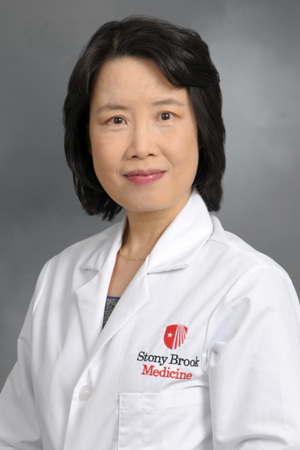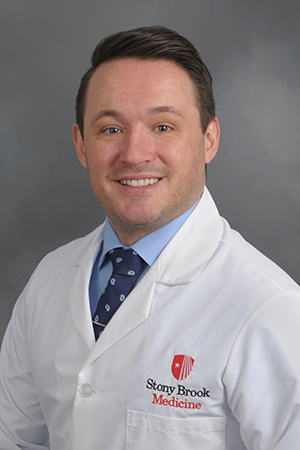Program Leaders

Wei Zhao, PhD
Professor of Radiology
Vice Chair of Research, Department of Radiology
Renaissance School of Medicine at Stony Brook University

Jacob Houghton, PhD
Associate Professor of Radiology
Director of PET Oncology Research
Renaissance School of Medicine at Stony Brook University
Overview
The Imaging, Biomarker Discovery and Engineering Sciences (IBES) Program aims to leverage advances in machine learning enabled by artificial intelligence (AI). These developments, coupled with advanced imaging and engineering science, translate into new tools and knowledge, which helps to prevent and treat cancer.
This goal is achieved by setting research priorities to promote scientific inquiry and discoveries that address the needs of Long Island residents within Stony Brook Cancer Center’s catchment area.
IBES capitalizes on historic strengths and discovery at Stony Brook University (SBU) in the physical and radiologic sciences. SBU is where magnetic resonance imaging (MRI) technology and the virtual colonoscopy (VC) were first developed. Collaborations with Brookhaven National Laboratory (BNL) resulted in the development and advancement of positron emission tomography (PET) imaging and low-dose radiation computer tomography (CT) for more sensitive and precise detection of breast, colon and lung cancers.
IBES has grown through strategic recruitments and development of collaborations between cancer biologists, biomedical engineers and bioinformaticians. IBES memberships span the Renaissance School of Medicine at Stony Brook University, the College of Arts and Sciences (CAS) and the College of Engineering and Applied Sciences (CEAS) at SBU. There are also significant collaborations between the IBES team and the members in the two additional thematic cancer research programs: Lipid Signaling and Metabolism in Cancer (LSMC) and Oncogenic Drivers and Mechanisms of Carcinogenesis (ODMC).
Program Goals
The primary objective of IBES is to integrate advanced imaging, engineering, and computer science through multiple platforms and across multiple scales, and to derive new knowledge aimed at reducing cancer incidence, morbidity and mortality. These goals will be achieved through the following two specific aims:
- To develop and translate clinically multi-modal cancer imaging technologies for cancer detection, diagnosis, prevention and treatment. Members are creating novel imaging strategies and platforms, including new imaging techniques, algorithms and agents, to advance the detection, treatment and prevention of diverse cancers, including breast, lung, colon and pancreas. Members are also evaluating the clinical utility and performance of novel imaging technologies and biomarkers to improve decision making for more precise cancer prevention and treatment
- To advance biomarker discovery with engineering and deep learning approaches to characterize the cancer phenotype at the multi-scale level. With leadership in digital pathology, radiology, biomedical informatics, computer science, and data and image analytics, members are uniquely poised to develop novel approaches to integrate and mine information about cancer obtained at multiple scales (single cell to whole organism) and across multiple data types. Work by members includes development of new techniques and data structures for multi-resolution and dynamic representations of very large volumes of primary and derived data from genomic, biochemical and imaging studies.
Program Members
Gábor Balázsi, PhD
Sabine Brouxhon, MD
Eric Brouzes, PhD
Chao Chen, PhD
Jules Cohen, MD
Zhaoqing Cong, PhD
Ramana V. Davuluri, PhD
Ken A. Dill, PhD
Qiaode Jeffrey Ge, PhD
Georgios Georgakis, MD
Kenneth Gow, MD, MSc, MHA
Jacob Houghton, PhD
Adrian Howansky, PhD
Arie Kaufman, PhD
Tahsin M. Kurc, PhD
Cindy Lee, MD, FACMQ, FSBI
Z. Jerome Liang, PhD
Jun Lin, MD, PhD
Kartik Mani, MD, PhD
Yubin Miao, PhD
Scott Moeller, PhD
Lilianne Mujica-Parodi, PhD
Barbara Nemesure, PhD
Daniel J. Ohngemach, MD, RPVI
Prateek Prasanna, PhD
Edwin C. Pratt, PhD
Robert C. Rizzo, PhD
Clinton T. Rubin, PhD
Joel Saltz, MD, PhD
Dimitris Samaras, PhD
Alison Stopeck, MD
Ulas Sunar, PhD
Dongyan Tan, PhD
Rina Tannenbaum, PhD (DSc)
Peter Tonge, PhD
Nashaat Turkman, PhD
Paul Vaska, PhD
Fusheng Wang, PhD
Jin Wang, PhD
Jun Wang, PhD
Ryan Williams, PhD
Sylvia Wood, PhD, DNP, ANP-BC, AOCNP
Wei Zhao, PhD

